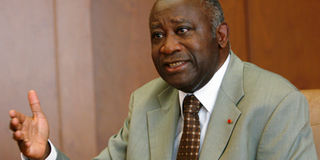Ivory Coast's president dissolves government

Ivory Coast's President Laurent Gbagbo on Friday dissolved his government. Photo/FILE
ABIDJAN, Friday
President Laurent Gbagbo said he had dissolved Ivory Coast's government and electoral commission on Friday, after a row over voter registration that threatens to derail his nation's fragile peace process.
"The government is dissolved. Today I asked that Prime Minister Guillaume Soro re-form a new government by February 15," he said on state-run national television channel RTI.
"The peace process is broken again."
The statement followed a decision by Soro, a former rebel, this week to suspend the process of registering voters indefinitely because of rising tensions, casting doubt on when the long-delayed presidential election would take place.
The elections are badly needed to end years of instability and stalemate after a 2002-2003 war that divided the world's top cocoa grower in two, leaving the north in rebel hands.
"The independent electoral commission is dissolved," Gbagbo said. "I asked the prime minister to propose in seven days the format of a new, credible electoral commission who can organise just and transparent elections."
Under a peace agreement signed in Burkina Faso in 2007, Gbagbo does not have the authority to dissolve the electoral commission, which is supposed to be independent of him.
Gbagbo said in his address he had invoked article 48 of the constitution to dissolve it. Opposition parties condemned the move and threatened to pull out of the next government when it is formed.
Delayed Peace
Elections in West Africa's once prosperous economic powerhouse have been repeatedly postponed since 2005. They had been scheduled for the end of this month or early next.
Gbagbo has accused electoral commission boss Robert Mambe, an opposition party member, of attempting to add to the voter register 429,000 names which had not had their Ivorian identity cross-checked, in an attempt to boost the opposition vote. "The bottom line is that this will cause huge delays and complicate matters," said independent analyst Gilles Yabi.
"All election activity will be suspended. This will create blockages in the process." The process of registering voters has been tortuous and fraught with disputes over Ivorian identity and who can vote -- explosive issues in a country that went to war over them.
"The president of this institution Mr Robert Mambe has carried out an illegal operation with the aim of obtaining the fraudulent inscription of 429,000 people on the electoral list," Gbagbo said in the statement.
All parties to the peace deal have to agree on the who is electoral commission boss, so the process of choosing another one could be long and drawn out. Many Ivorians have grown cynical over talk about elections after years of delays. Frustration is growing.
Rioters burned down a government building in rebel-held western Ivory Coast on Tuesday over the government's handling of the polls. "Just when we think we are reaching our goal to have clean elections, we notice that peace that we have passionately elaborated has been taken hostage by political parties," Gbagbo said.
Opposition candidates Henri Konan Bedie and Alassane Ouattara accuse Gbagbo of deliberately creating obstacles for the process to keep himself in power, a charge he denies. Officials from both of their political parties said they would refuse to participate in the next election.
"We are shocked by this decision which clearly shows the desire of the head of state to avoid elections. We cannot accept dictatorship in Ivory Coast," said Anne Ouleto, spokeswoman for Ouattara's Rally of the Republicans party. Konan Bertin, president of the youth wing of Bedie's Ivory Coast urged Ivorians not to accept Gbagbo's decision.




